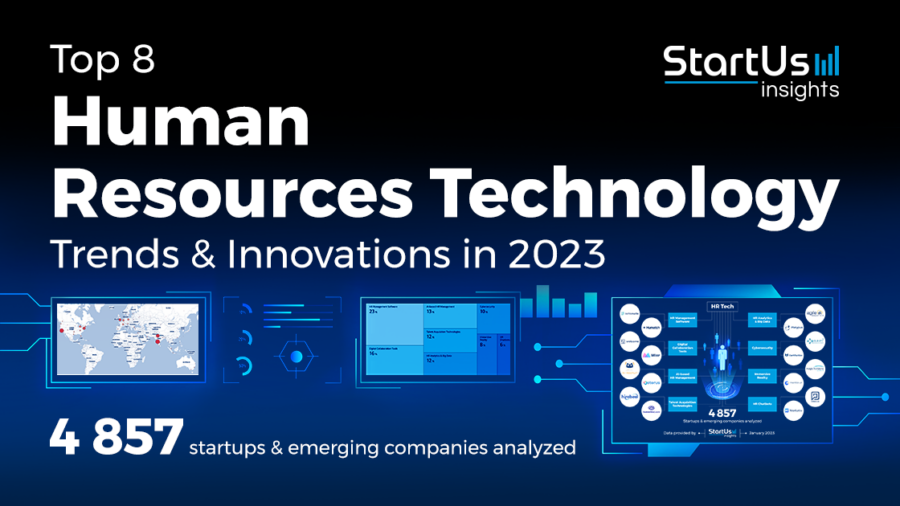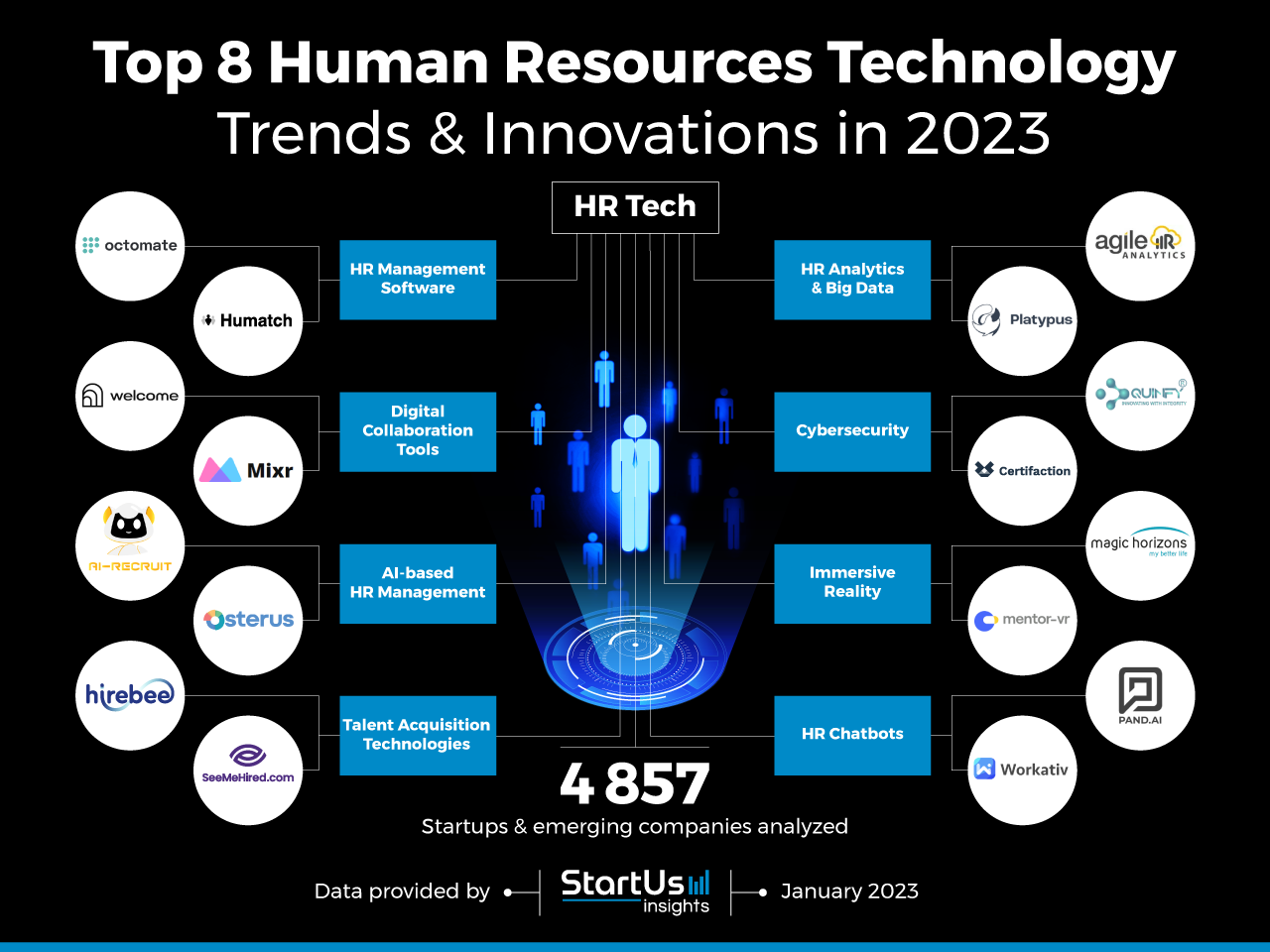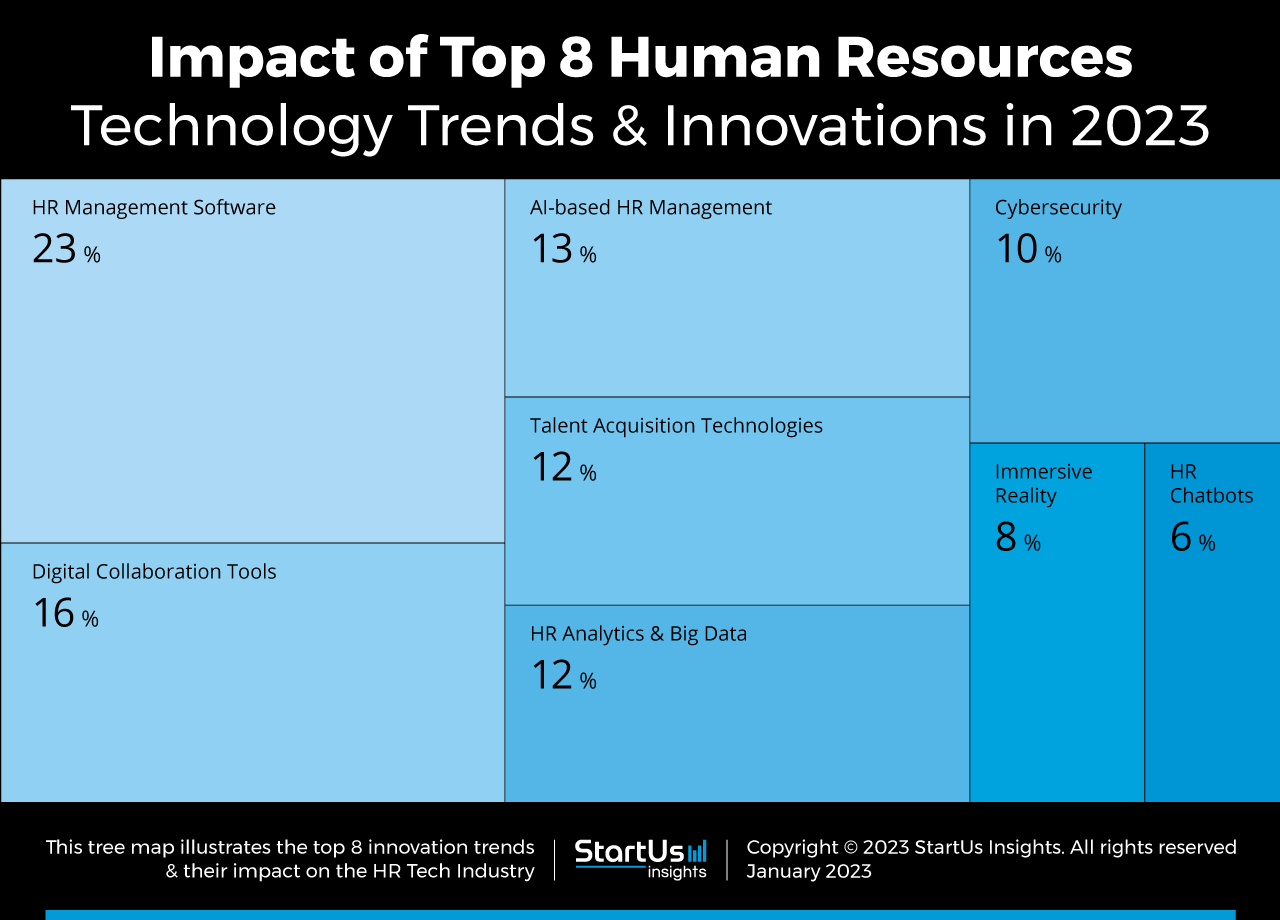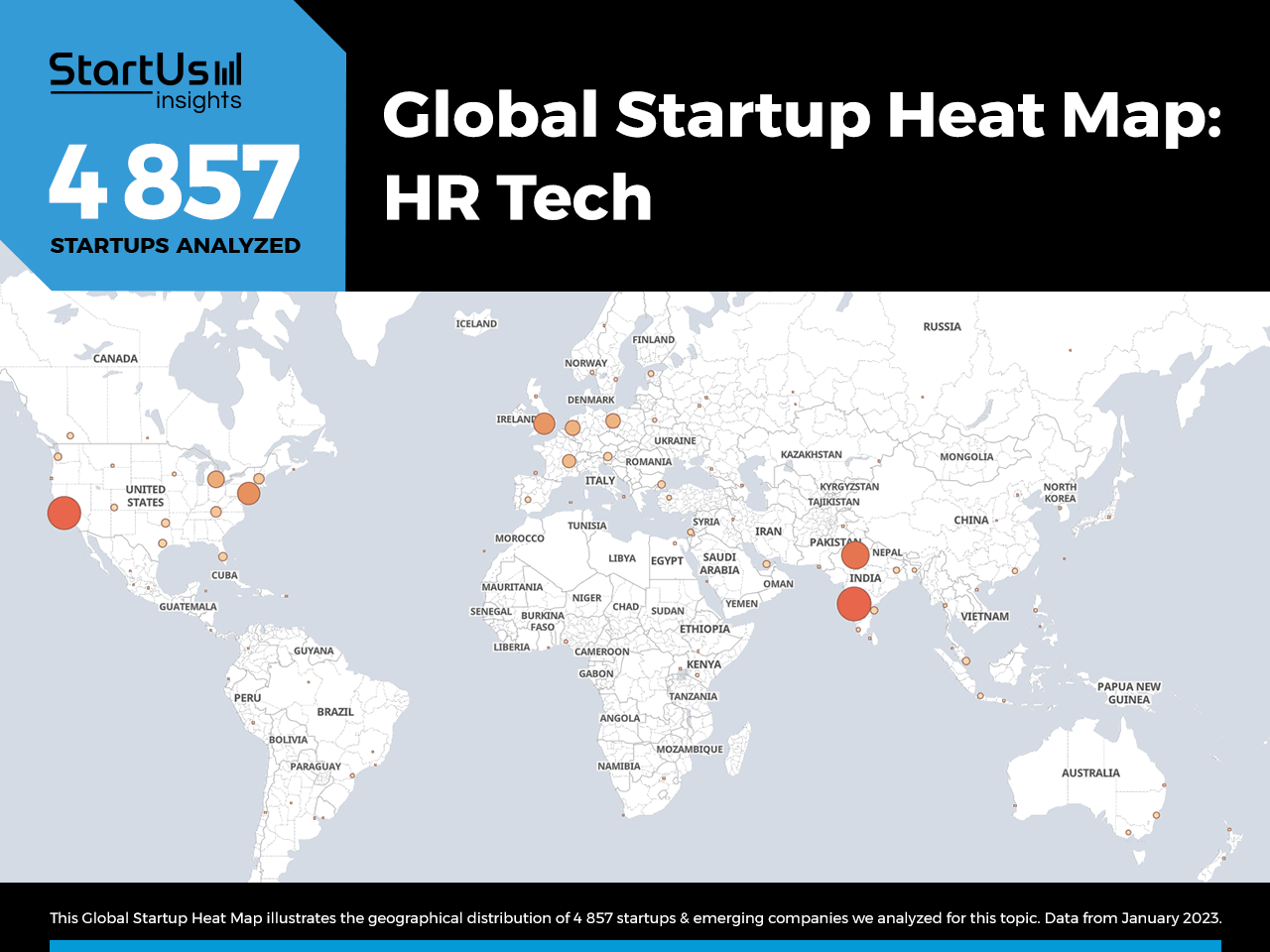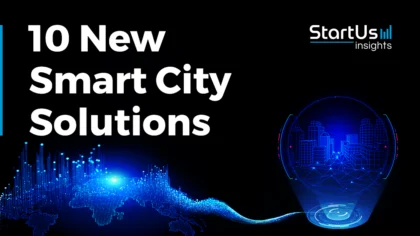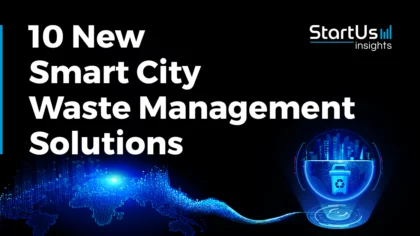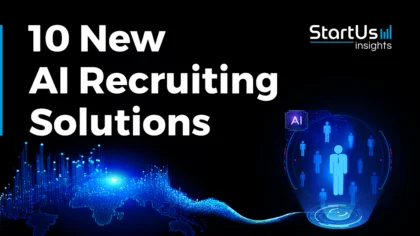The COVID-19 pandemic considerably influenced employees and their working styles globally. It is also moving most of the recruiting processes in the HR industry into online mediums. To adapt to the new conditions and maximize efficiency in the current circumstances, companies rely on emerging HR technologies. This article contains the top 10 human resources technology trends that are reshaping the industry in 2023. Some examples of HR Tech solutions include automating time-consuming tasks, minimizing human error, and increasing hiring efficiency.
Innovation Map outlines the Top 8 Human Resources Technology Trends & 16 Promising Startups
For this in-depth research on the Top Human Resources Technology Trends & Startups, we analyzed a sample of 4 857 global startups and scaleups. The result of this research is data-driven innovation intelligence that improves strategic decision-making by giving you an overview of emerging technologies & startups impacting HR management. These insights are derived by working with our Big Data & Artificial Intelligence-powered StartUs Insights Discovery Platform, covering 2 500 000+ startups & scaleups globally. As the world’s largest resource for data on emerging companies, the SaaS platform enables you to identify relevant startups, emerging technologies & future industry trends quickly & exhaustively.
In the Innovation Map below, you get an overview of the Top 8 Human Resources Technology Trends & Innovations that impact 4 857 companies worldwide. Moreover, the Human Resources Technology Innovation Map reveals 16 hand-picked startups, all working on emerging technologies that advance their field.
Top 8 Human Resources Technology Trends in 2023
- HR Management Software
- Digital Collaboration Tools
- AI-based HR Management
- Talent Acquisition Technologies
- HR Analytics & Big Data
- Cybersecurity
- Immersive Reality
- HR Chatbots
Tree Map reveals the Impact of the Top 8 Human Resources Technology Trends
Based on the Human Resources Technology Innovation Map, the Tree Map below illustrates the impact of the Top 8 Human Resources Technology Trends in 2023. Startups develop technologies to optimize human resources and automate tasks such as recruiting, onboarding, or employee training. HR management software (HRMS) enables managers to gather personnel information. Digital collaboration tools allow remote teams to work effectively and build the company culture. Artificial intelligence (AI), immersive technologies, chatbots, and talent acquisition technologies also integrate into hiring workflows to accelerate candidate journeys and improve employee experiences. Lastly, HR analytics and big data enable pattern identification and future prediction, while cybersecurity prevents recruitment fraud.
Global Startup Heat Map covers 4 857 Human Resources Technology Startups & Scaleups
The Global Startup Heat Map below highlights the global distribution of the 4 857 exemplary startups & scaleups that we analyzed for this research. Created through the StartUs Insights Discovery Platform, the Heat Map reveals that India sees the most startup activity, followed by the US and Western Europe.
Below, you get to meet 16 out of these 4 857 promising startups & scaleups as well as the solutions they develop. These HR tech startups are hand-picked based on criteria such as founding year, location, funding raised, and more. Depending on your specific needs, your top picks might look entirely different.
Top 8 Human Resources Technology Trends in 2023
1. HR Management Software
Companies increasingly use HR management (HRM) software to manage and optimize everyday HR tasks. Such tools enable HR managers to track personnel information and improve workforce management and talent management for recruiting, onboarding, learning, and development. With the use of the Internet of Things (IoT) and AI, HRMS automates various back office tasks, keeps workflows organized, increases hiring efficiency, and improves employee experiences.
Octomate builds a Workforce Management App
Singaporean startup Octomate develops a mobile application for workforce management. It tracks workforce transactions and stores payroll-related transactions securely using blockchain, which can be retrieved and checked in real-time. The app provides employee data, facilitates workforce engagement by publishing announcements, and features leaves submission configuration and location-based tracking. This allows HR teams to digitize operations and reduce manual errors.
Humatch develops HR Information Software
French startup Humatch 0ffers HR information software (HRIS) for data centralization and automating administrative formalities. It automatically generates employment contracts and amendments as well as collects and distributes digital documents. Additionally, the software simplifies interactions between employees and HR departments by providing a common platform for HR-related requests. The startup’s solution simplifies HR management and also allows employees to manage their evaluations and assignments directly through the HRIS.
2. Digital Collaboration Tools
The trend of remote and hybrid working continues to endure post-pandemic, pushing managers to facilitate teamwork and allow employees to participate, communicate, and build virtual company cultures. Digital tools have many options for team collaboration – from team communication and project management to simultaneous product development and code writing. They enable the entire workforce to improve communications, enable visual project management, delegate tasks, and monitor progress. HR digital collaboration tools, in turn, improve employee productivity and strengthen inter-team relationships.
Welcome offers a Virtual Employee Event Platform
US-based startup Welcome develops a live-video platform to increase employee engagement. It enables seamless all-hands meetings, employee onboarding, team building, and employee resource groups. The platform enhances employee participation with its in-built live Q&A, embedded polling features, elevated branding, and brainstorming sessions. Additionally, the platform identifies the most engaged employees and key milestones to provide engagement analytics and KPIs tracking.
Mixr facilitates Remote Team Building
Canadian startup Mixr develops a social team-building platform for remote teams collaboration and company culture building. It engages employees and allows them to connect and socialize while playing arcade games. Game tournaments feature automated breakout rooms, integrated games, leaderboards, and integrated video and audio chat for participants’ interaction. This improves the connection between isolated remote employees and reinforces positive working relationships to boost overall satisfaction.
3. AI-based HR Management
AI revolutionizes every aspect of HR management by processing vast amounts of data quickly and accurately. Startups leverage AI to automate various operations that free up HR managers from repetitive and time-consuming tasks. They include employee onboarding and training as well as employee engagement assessment. During the recruitment phase, AI aids HR managers in filtering and analyzing applications. AI also integrates throughout the recruitment lifecycle and improves individual employee engagement. This allows HR teams to increase productivity and empowers employees and candidates with automated recruitment assessment, predictive analytics, and AI-based coaching.
AI-Recruit provides an AI-based Recruitment Bot
South African startup AI-Recruit automates the recruitment process through an AI-based recruitment bot. It performs hiring tasks like CV reading, personality profile creation, and interview scheduling to provide the best candidate recommendations. The bot’s pre-screening tool reduces the time to interview prospective employees and increases recruiter productivity.
Osterus makes an AI-based Application Sorting Algorithm
German startup Osterus develops an AI-powered sorting algorithm for filtering job applications. It analyzes the structure, formatting, culture, activities, education, qualifications, and accomplishments of applications while running a comparison of similar profiles. Additionally, it offers insights into career relevance and workforce traits. Osterus’s solution, thus, speeds up the hiring process and provides a better understanding of competitor hiring practices.
4. Talent Acquisition Technologies
The demand for high-quality talent grows every day, forcing HR departments to creatively attract new employees. To achieve this, startups develop technologies that optimize candidate selection processes and improve recruiter communication experiences. For example, AI-enabled application tracking systems (ATS) digitize and centralize all candidate information in a single platform and automates traditional in-person or phone-based tasks. Asynchronous video technology further allows candidates to attend remote interviews and allows recruiters to accelerate candidate selection. During recruitment, HR managers also leverage gamification using augmented reality (AR) to assess the creative component of candidates and determine their character traits.
Hirebee develops a Candidate Relationship Management Platform
UK-based startup Hirebee creates a talent acquisition and candidate management platform that covers the entire recruitment value chain. It aids relationship management and offers reporting, applicant data analytics, and AI-based screening to identify the best candidates. The platform also improves recruitment marketing and enables candidate sourcing from multiple channels, structuring and expediting recruitment processes.
SeeMeHired offers Cloud-based Talent Acquisition Software
UK-based startup SeeMeHired provides cloud-based talent acquisition software for in-house teams. It is an applicant tracking and hiring software that provides job post creation and publishing tools, applications screening, and communication channels with candidates. The software allows HR teams to schedule and conduct video interviews without relying on third-party tools and provides hiring statistics reports. SeeMeHired streamlines the recruitment process by moving away from a manual system and combining all essential HR tools for managers in one platform.
5. HR Analytics & Big Data
HR analytics and big data improve recruitment, training, employee development, and performance, enabling smarter decisions to achieve the company goals. With the help of big data, managers easily filter through candidate resumes and select the most promising ones. The technology also allows measuring the effectiveness of the implemented changes in employee training processes. Moreover, HR analytics and big data make it possible to identify common health problems of employees and the reasons for their dismissal to implement measures to prevent such situations. Further, these technologies are useful to identify patterns and trends in an organization and managers utilize this data to gauge future opportunities.
Agile HR Analytics offers an HR Analytics & Reporting Solution
Australian startup Agile HR Analytics develops an end-to-end analytics and reporting solution. Its dashboard connects HR systems, by taking data from operational reporting to advanced analytics, and derives deeper workforce insights. The solution allows HR managers to assess training needs, view performance ratings, and predict future trends for diversity, absenteeism, and performance metrics. This aids organizations to discover HR insights and enable data-driven decision-making.
Platypus provides a Culture Analytics Platform
Danish startup Platypus makes an HR platform that provides detailed analytics on work culture. It uses cultural insights to improve alignment and engagement at all stages of the talent lifecycle. The platform allows HR managers to monitor employee values and dig into subcultures of individual teams. Additionally, it features a culture assessment tool that identifies cultures that candidates will thrive in and compare them to the current team dynamics, improving employee satisfaction.
6. Cybersecurity
With the rise of digital technologies applied in the organization, cybersecurity becomes a top priority. To protect sensitive data and limit both internal fraud and external hacks, companies integrate blockchain technology. Decentralization of IT infrastructure allows rapid recognition of suspicious activity. Moreover, it improves payroll and information verification processes. For example, data asset management systems ensure the security of the IT environment by keeping track of both authorized and unauthorized software. Cybersecurity solutions also prevent hackers from tracking the data of remote workers and guarantee protection and security for long-term work efficiency.
Quinfy simplifies Employee Background Verification
Indian startup Quinfy offers a blockchain-based identity and background verification solution. The startup offers continuous verification, a lifelong portfolio, and high security of personal data. Permitted applicants acquire virtual credentials in a distributed private blockchain network, which provides an immutable record of their work history. The solution enables trustful relationships and eliminates the chances of fraudulent applications.
Certification provides eSignatures
Swiss startup Certification develops an eSigning solution for HR teams. Privacy-preserving eSignatures protect sensitive employee data. The startup’s solution allows to follow up signing status of work contracts from computers and receive automatic notifications when the employment contract has been signed. It speeds up recruiting processes due to paperwork reduction and the possibility to sign documents digitally expands opportunities for hiring employees from diverse locations.
7. Immersive Reality
To effectively establish communication between employees and the organization, companies introduce immersive technologies such as AR and virtual reality (VR). VR aids in hiring and recruiting by offering a better understanding of the organization and work environment. Moreover, it enables companies to create and gamify simulated environments to effectively train employees for the physical and communication skills required for the jobs. These innovations enable HR managers to collect additional information that cannot be obtained by conventional means. In addition, VR significantly improves the onboarding process by providing the new employees with a virtual tour of the office colleagues.
Magic Horizons offers VR-based Stress Reduction Software
German startup Magic Horizons develops VR solutions for employee stress reduction and resilience. The startup’s VR software provides mental regeneration and stress prevention through relaxation frequencies and immersive visual relaxation. Workers virtually travel through the world of nature, inducing a positive effect on mental health and a state of relaxation. The solution promotes mental regeneration and relaxes employees, increasing their productivity and preventing burnout.
Mentor-VR develops a Virtual HR Platform
Spanish startup Mentor-VR designs a VR platform for human resource management. It features VR recruiting, talent onboarding, employer branding, and learning. In addition, the platform allows organizations to virtually introduce key people and advance communication through virtual group presentations. This enables companies to attract talent and onboard them as productive employees quickly.
8. HR Chatbots
As remote work becomes common, it is essential to provide employees with the necessary support and information to operate efficiently. HR chatbots function as virtual assistants to simplify the recruitment process and communicate with candidates when they need help. They are equipped with emotional intelligence through tools like natural language processing (NLP) and sentiment analysis, allowing chatbots to detect emotions such as anger and demotivation. Chatbots also leverage the HR department’s work throughout the recruiting process by automating complex functions such as scheduling interviews and managing employee recommendations.
Pand.ai develops an Employee Management Chatbot
Singaporean startup Pand.ai develops an AI-powered HR chatbot for employee management. It allows companies to onboard new team members and handle employee leave applications using automated rules. The startup’s chatbot also manages employee payroll and sends important information to team members. This enables HR managers to become more accessible to employees, allowing for interactions with each employee and reacting to their specific enquires or requests.
Workativ develops a Conversational AI Platform
US-based startup Workativ automates HR workflows by developing a conversational AI platform, Workativ Assistant. It provides tools for HR chatbots with prebuilt workflow automation modules. Besides, it autonomously resolves employee issues and service requests such as salary inquiries, leave applications, expense claims, and policy searches. The chatbot also provides employee onboarding via MS Teams or Slack, eliminating the need to contact IT and HR teams. This enables companies to automate HR processes and deliver remote employee support.
Discover all Human Resources Technology Trends & Startups
The emerging HR technologies such as AI and robotics enable a more efficient selection of candidates and improve their communication experience and training possible. Further, VR and AR improve collaboration between employees. At the same time, improving employee retention, employee engagement, and corporate culture management with AI, big data, and IoT becomes essential for making business decisions.
The Human Resources Technology Trends & Startups outlined in this report only scratch the surface of trends that we identified during our data-driven innovation and startup scouting process. Among others, employee engagement, remote workforce management, and immersive collaboration technologies will transform the sector as we know it today. Identifying new opportunities and emerging technologies to implement into your business goes a long way in gaining a competitive advantage. Get in touch to easily and exhaustively scout startups, technologies & trends that matter to you!
